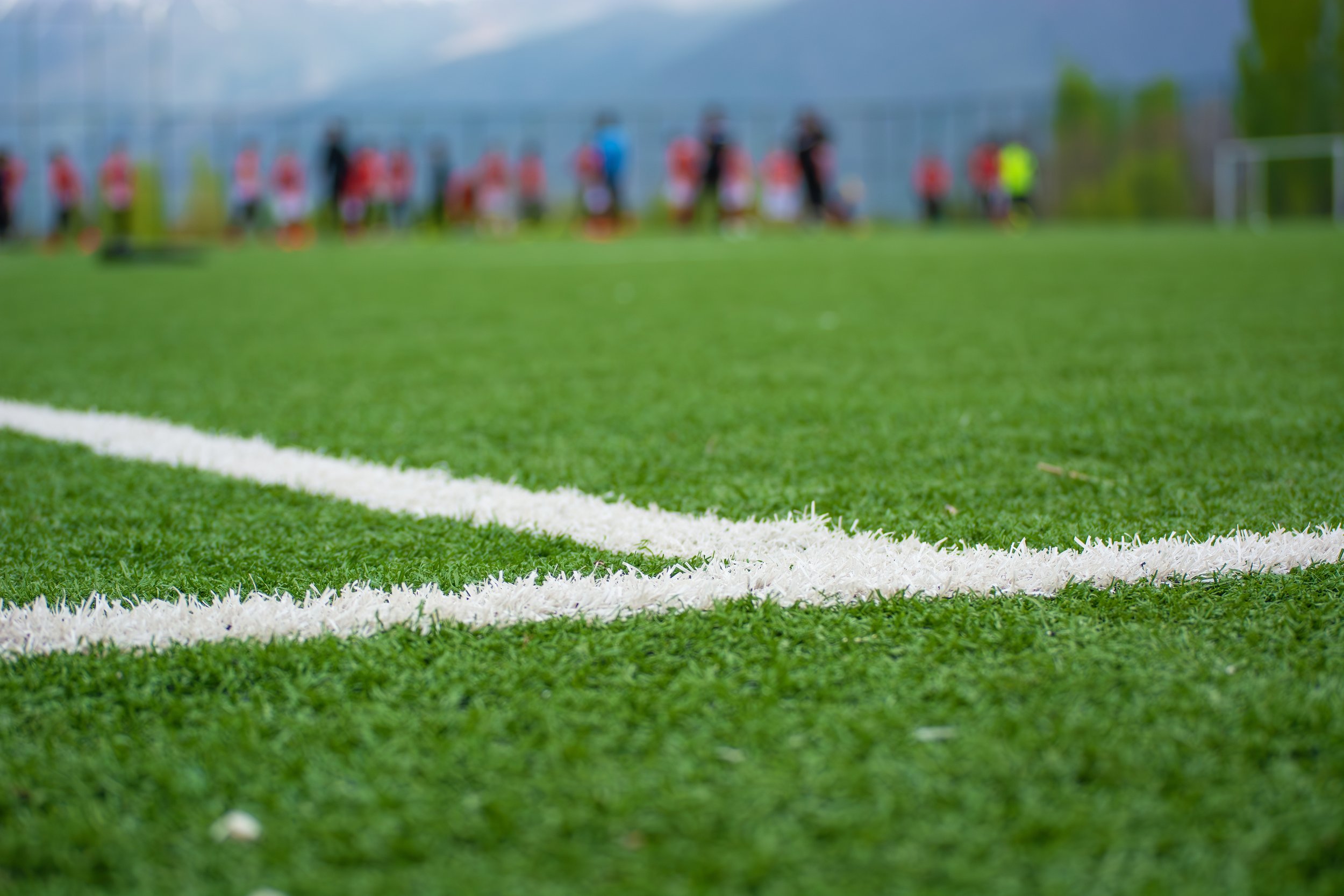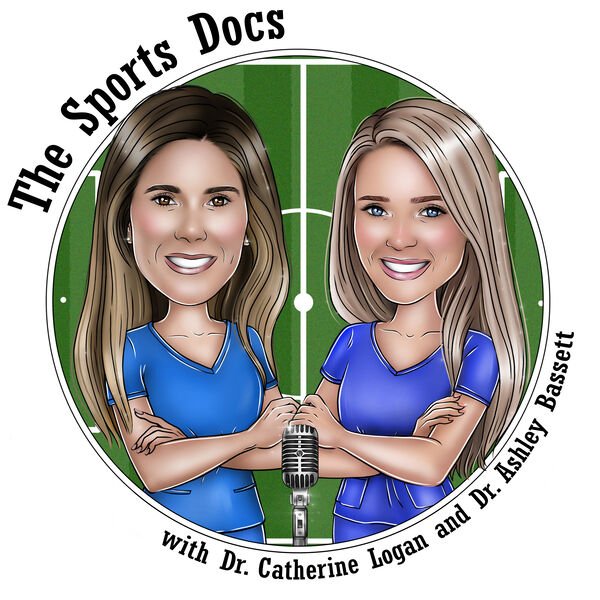
The Sports Docs Podcast
Join orthopedic sports surgeons, Dr. Catherine Logan & Dr. Ashley Bassett, as they chat about the most recent developments in sports medicine and dissect through all the noise.

The Sports Docs – Dr. Logan & Dr. Bassett – are friends & former co-residents from the Harvard Combined Orthopaedic Residency Program, who went onto esteemed sports medicine fellowships at The Steadman Clinic and The Rothman Institute, respectively.
Sports medicine is a constantly evolving field, with hundreds of new articles published each month on the topic. This ever-growing wealth of information can make it challenging to stay updated on the newest approaches and techniques, and to know which data should actually change your practice.
On each episode of The Sports Docs podcast, the hosts will tackle a specific injury – from ACL tears to shoulder instability – and review the top research from various high-impact journals that month, including The American Journal of Sports Medicine, Arthroscopy: The Journal of Arthroscopic and Related Surgery, Sports Health, Journal of Shoulder and Elbow Surgeons, and more.
The Sports Docs will also be joined by experts in the field of sports medicine – orthopedic surgeons, nonoperative sports medicine specialists, athletes, physical therapists, athletic trainers and others – to provide a fresh and well-rounded perspective based on their unique experiences.
Latest Episodes
Our conversation picks back up with an article titled “Patient Outcomes and Return to Play After Arthroscopic Rotator Cuff Repair in Overhead Athletes.” This systematic review, published in the January 2023 issue of JOT, analyzed 20 studies comprising 692 patients with an average follow-up of 40 months. The authors found that arthroscopic cuff repair led to significant improvements in patient reported outcomes as well as improved shoulder elevation
On today’s episode we’re focusing on the thrower’s shoulder with Dr. Sara Edwards, an orthopedic sports medicine and shoulder surgeon at UCSF. We have some great articles for you that contribute well to our conversation on different shoulder pathology in the overhead throwing athlete.
We start off our discussion today with a review article from the April 2023 issue of the yellow journal titled “Surgical Treatment of Superior Labral / Biceps Pathology in the Overhead Thrower.”
As you might remember from our episode on ACL graft choices, these Game Plan episodes are specifically designed for patients – to hopefully answer some of the questions you have about the most common sports medicine conditions and surgical treatments.
We’re continuing with our favorite topic today – ACL tears – but today’s episode is going to focus on risk factors for ACL tears. Specifically, which of these risk factors can we modify to lessen the chance of sustaining ACL tear and how do we decrease that risk.
Today, we’re talking about Cyclops Syndrome after ACL reconstruction surgery. We review an article published in this month’s issue of AJSM titled “Risk Profile for Cyclops Syndrome Necessitating Reoperation After Anterior Cruciate Ligament Reconstruction.” But first, let’s back up a bit and discuss the basics, starting with what Cyclops Syndrome is.
Welcome to GamePlan with the Sports Docs. On each of these mini episodes, we chat about a new article or new surgical technique in the field of sports medicine. We’ll give you our quick take on the most recent data and how this data will be impacting our practice.
Today, we’re talking about hamstring injuries in the NFL. And if your fantasy team is anything like my fantasy team, it currently looks like an infirmary. So, you’ll probably want to listen in to this episode.
Today, we’re heading back to the NFL to discuss a surprisingly serious injury – turf toe. In Week 2 of the 2025 NFL season, Cincinnati Bengals quarterback Joe Burrow was sacked and sustained left great toe injury. This was ultimately diagnosed as a grade 3 turf toe injury requiring surgery. Burrow was placed on injured reserved and elected to undergo surgical repair. While the surgery reportedly went well, timing for return is uncertain, though initial estimates are around 3 months.
We get lots of questions from our patients and our listeners each week - and they’re great questions, so rather than responding individually we thought we’d do these mini episodes. Today we will be tackling:
“What are the most studied and most effective supplements currently for sports medicine patients — both for performance and for injury recovery?”
“What’s the current evidence and your view on the NICE ROCC palm cooling device? Does it really enhance recovery or performance?”
“What’s the latest on bracing for shoulder dislocations when returning to sport? Are functional braces advisable, and in what role do they play?”
Today, we’re diving into one of the most serious injuries in American football, and that is a knee dislocation. Dolphins star wide receiver Tyreek Hill recently suffered a devastating knee injury in the Monday Night Football game versus the Jets. He dislocated his knee resulting in multiple torn ligaments, including his ACL. Tyreek was taken to the hospital directly from the game for further evaluation and ended up undergoing urgent surgery for ligament reconstruction and repair.
Welcome to another episode of Game Plan! These Game Plan episodes are specifically designed for patients – to hopefully answer some of the questions you have about the most common sports medicine conditions and surgical treatments. But today’s episode is a little different and we’re excited about it! Today, we’re focusing on common injuries in the NFL and how these injuries impact time missed and player performance once athletes ultimately return to play.
In this episode, we’re going to continue our discussion with Dr. Travis Matheney and focus on surgical treatment options for borderline hip dysplasia.
Our conversation picks back up with a review article published in the December 2024 issue of Current Reviews in Musculoskeletal Medicine titled “Borderline Hip Dysplasia - Best Treated with Hip Arthroscopy or Periacetabular Osteotomy?”











![✨NEW episode is LIVE!✨
We chat with Dr Aaron Krych [ @ajkrych ] all about advances in medial meniscus root repair. Dr. Krych is the Chair of Orthopedic Surgery and a Professor of Orthopedic Surgery at the Mayo Clinic [ @mayoclinic ]. He is also the](https://images.squarespace-cdn.com/content/v1/6467a6d30b89e459018f4536/1733147506901-3D2W3Y210X5TTQFZJBAR/image-asset.jpeg)







![✨NEW episode is LIVE!✨
We continue our chat with Dr. Rachel Frank [ @rachelfrankmd ] — an Associate Professor of Orthopaedic Surgery and Director of the Joint Preservation Program at the University of Colorado School of Medicine [ @cuboulder ]](https://images.squarespace-cdn.com/content/v1/6467a6d30b89e459018f4536/1727701890993-35YX5U2DVOPW3EDC9DS5/image-asset.jpeg)
![✨NEW episode is LIVE!✨
We chat with Dr. Rachel Frank all about concussions and emergency action planning. A very timely topic given the start of fall sports!
Dr. Frank [ @rachelfrankmd ] is an Associate Professor of Orthopaedic Surgery and Director](https://images.squarespace-cdn.com/content/v1/6467a6d30b89e459018f4536/1727095764635-LYRYX9FDVINLIF91LKW4/image-asset.jpeg)
![✨NEW episode is LIVE!✨
We chat with Dr. Brian Cole [ @brianjcolemd ] all about rotator cuff repair augmentation. Dr. Cole is a Professor of Orthopedic Surgery and Chair of the Department of Orthopedic Surgery at Rush University Medical Center [ @mor](https://images.squarespace-cdn.com/content/v1/6467a6d30b89e459018f4536/1726492292132-BPNXTEAZ240YQ46R0A1W/image-asset.jpeg)
![✨ NEW episode is LIVE! ✨
We’re coming to you again from the AOSSM [ @aossm1972 ] 2024 Annual Meeting in Denver, Colorado! Over these eight episodes, we explore some of the hottest topics in sports medicine with experts at the AOSSM Annual Meet](https://images.squarespace-cdn.com/content/v1/6467a6d30b89e459018f4536/1725885659851-BR7DF2BQ2M7OCRVQ23WY/image-asset.jpeg)